SPSFC 4 Semifinalists: Saint Elspeth and Yours Celestially
Nearly six months ago reading began in the fifth edition of the Self-Published Science Fiction Competition (SPSFC). Our team Ground Control to Major Tom had an allocation of 30 books and chose these six quarterfinalists:
- Drowning Earth by Sean Willson (Kindle)
- Enigma by Ryan Southwick (Kindle)
- Of Friction by S. J. Lee (Kindle)
- Our Lady of the Artilects by Andrew Gillsmith (Kindle)
- Saint Elspeth by Wick Welker (Kindle)
- Yours Celestially by Al Hess (Kindle)
For the semifinals, the scores were as close as any quarterfinals since the SPSFC began. Every one of the six books had at least two judges award it a 9 or a 10 (on a scale of 10!). The margin between the second and sixth place books was just 0.3. Every one of these novels is recommended -- use the links above to check them out.
In randomly selected order as affirmed by the accounting firm PriceWaterhouseCoopers, the first of our two semifinalists is Saint Elspeth by Wick Welker.
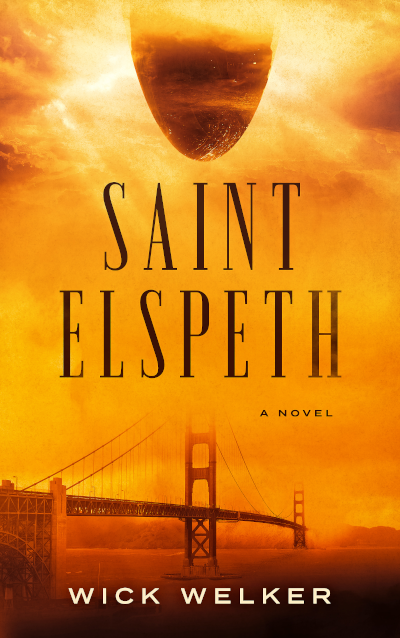
The novel takes place after the arrival of aliens on Earth, which truth be told could have been handled better by all sides. There was global thermonuclear war and now that 25 years have passed (along with most of humanity), Dr. Elspeth Darrow is the last doctor at the last hospital in Neo San Francisco, serving 15,000 patients with no HMOs and almost no medicine. She must travel to the California danger zone on a salvage run for antibiotics and diuretics.
Judges liked the medical realism brought by Welker, who is an ICU doctor, and the protagonist Elspeth. One wrote, "Welker has something to say about humanity, the nature of first contact, the possibilities of a post-apocalyptic world, and the essential decency of people when you let them be decent."
The second semifinalist is Yours Celestially by Al Hess.
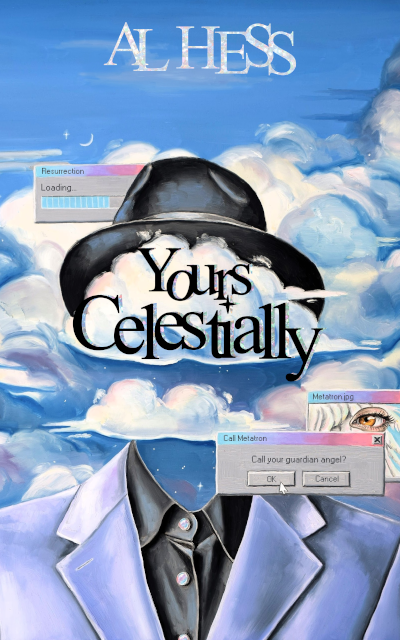
This is a novel about how death doesn't solve all your problems. Sasha bought his own resurrection, which cost a lot of money -- but as they say, you can't take it with you. He came back to all the old regrets: divorce, emotional estrangement from the daughter he never got to see enough. He also brought back a bug -- the uninvited one-way thoughts of Metatron, the AI guardian angel from Limbo who uploaded him into a new bod. Metatron is crushing hard for somebody and that's all the angel thinks about 24/7. This "secondhand love sickness" compels Sasha to take a job with the resurrection company so he can purloin Metatron's email address and unsubscribe his brain.
Variations of the word "charmed" were used by multiple judges assessing this book. One said, "Sasha bemoans a messed up life. When you see it though, he has a tribe that cares deeply what happens to him. I like his people. And I can't overstate the care with which Hess handled everyone's mess."
Congratulations to Wick Welker and Al Hess! Their books will be now read by two other judging teams over the next two months as SPSFC determines the books that will advance to the finals.
A point of clarification: PriceWaterhouseCoopers did not ensure these two books were announced at random. We apologize to Moonlight, La La Land, Warren Beatty and Faye Dunaway.
SPSFC 4 Quarterfinalist: Enigma
Seven score and 14 days ago, the judges of Ground Control to Major Tom received 32 books in our scout pile for the Self-Published Science Fiction Competition (SPSFC). Team members read the novels and we picked six to become quarterfinalists. They're now being read by all judges on the team to decide our two semifinalists.
The last book we are announcing as an SPSFC 4 quarterfinalist is Enigma by Ryan Southwick.
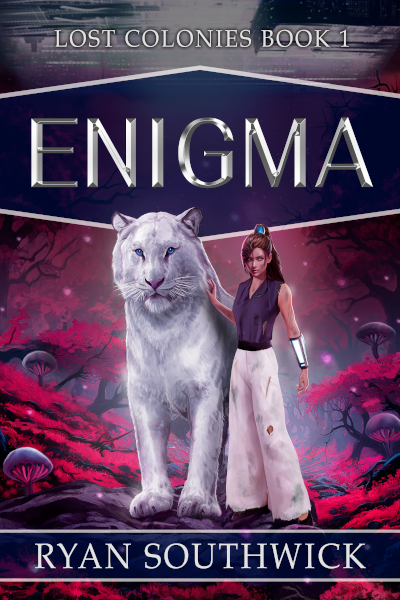
Nearly 10,000 years ago Earth was conquered by the Uu'nok, sending survivors scattering across the galaxy in nine colony ships to build human civilization anew, far from the reach of the usurpers. Twenty years ago faster-than-light fold engines were developed, bringing four of the Lost Colonies together again. A lot of differences can arise over a decamillennium. Galileo colony embraces science and pacifism, Entropia personal liberty and Fortunus unfettered capitalism. Vice takes the more practical (make that pessimistic) view that high-minded ideals are secondary to the ability to wage war.
Galileo Ambassador Britta Silverstar welcomes diplomatic representatives of the other colonies to a space station orbiting Enigma, a galactic backwater that has unexplained atmospheric interference which defeats probes. The ambassadors view the planet as such a big yawn they're more interested in hooking up than asking questions. Then Britta presents them with a history-making show-and-tell:
[A] high-altitude picture appeared of a lush planet. A thick forest of fuchsia-leaved trees lay directly below. Snow-topped mountains peaked the outer edge.
What made everyone stare, however, was the faint cluster of lights in the upper-right quadrant.
Tanner stepped closer, squinting at the image. "Natural phosphorescence?"
"That was our first guess, until we zoomed in and cleaned up the image."
Britta triggered the next program sequence. The picture changed. It was grainier than the first, but a round of gasps said the implications were clear to everyone.
"Buildings," Hausen said softly. "And roads. Who are they?"
"We're not entirely sure."
"Human?" Bard said, eyes glinting.
"Yes and no."
Another lost colony has been found, this one reduced to horse travel and feudalism. After more probes and a human-piloted mission all lose contact, Britta reveals plans the best scientists of Galileo have devised to visit Enigma on a newly constructed space elevator. Quickly this best-laid scheme gang aft a-gley, which is how a Scottish poet says FUBAR.
An unforeseen betrayal sends Britta to the planet surface in an "accident" where she's believed dead. Her closest friend Crystal, a quirky fold scientist, is still laid flat by grief when she must flee the station to stay alive. These women have a friendship that transcends the term and both must play a crucial role in the spiraling events without their better half.
Several judges were intrigued by the colonies going through the awkwardness of a human family reunion at a moment where the urgency of cooperation couldn't be more life and death.
Richard's Reviews (Goodreads):
The plot centers around the themes of fighting vs. pacifism and weapons vs. diplomacy with our main character, Britta, working to build cooperation between divergent worlds and cultures. That does not mean there aren't a few fights and battles but this book is anything but a typical space opera. Don't let the mention of diplomacy fool you, the action in this tale is non-stop and I found myself reading faster and faster to find out what came next.
What comes next for SPSFC is the announcement of semifinalists in no score and 19 days.
SPSFC 4 Quarterfinalist: Our Lady of the Artilects
One of the perks of reading books for the Self-Published Science Fiction Competition (SPSFC) is that contest authors don't color within the lines. Either because they don't know the implicit genre expectations of traditional publishers or they intentionally choose to ignore them, self-published writers aren't afraid to boldly go where no science fiction author has gone before.
The fifth book chosen as an SPSFC 4 quarterfinalist by Ground Control to Major Tom is one of those enterprising explorers: Our Lady of the Artilects by Andrew Gillsmith.
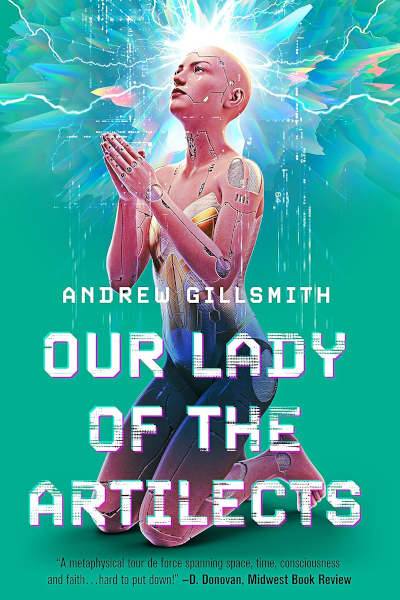
Our Lady of the Artilects takes place on a near-future Earth after a 50-year cold war has shifted global power towards China and Africa. There are some extremely powerful AI androids so expensive to maintain only the ultrawealthy can afford them. Africa's richest person has a synth named Thierry, who has become indispensable as an assistant and confidant. One day Thierry vanishes and turns up later at the Basilica of Our Lady of Nigeria, telling priests that he is demonically possessed.
At this point the novel starts to feel like a modern religious thriller pushed forwards a few decades. The Vatican sends an exorcist who is also a neuroscientist, Father Gabriel Serafian, to investigate. As the leaders of both the Catholic Church and the Caliphate monitor the situation, Serafian must determine whether Thierry is possessed, why all the world's synths report having a religious vision and whether a synth can have free will. The book does not shy away from big questions.
Throughout his career, he had argued that it might be possible for synths to develop free will. The God he worshiped was a God of details, a God of wonders. No such God would allow a creature to possess free will and be deprived of a soul. It would be an unimaginable cruelty, like having the ability to taste but not eat.
Serafian followed the inexorable Thomist logic. To be possessed meant to have a will. To have a will, an intellect, and emotion, meant having a soul. New souls. Beautiful souls -- plural, more than one. Had God, in His infinite goodness, really opened an entirely new chapter in salvation history? If so, it would be the most astonishing thing that had happened since the Incarnation.
And now, Thierry was gone.
The situation is so fraught for religious and political authorities that Serafian is told to get the answers while the information can still be controlled. He's repeatedly reminded, "this is not an exorcism."
Judges became believers in Gillsmith's ability to weave together religion, philosophy and science. One called the book "a sci-fi Dan Brown on steroids!"
Richard's Reviews (Goodreads):
Gillsmith raises quite a few interesting questions about Artificial Intelligence, religion, good and evil, and the purpose of human life. As he puts it, “I believe that everything happens for a purpose. I just don’t believe that the purpose is knowable.” Fortunately, he also tells us that “some questions are unanswerable ... when one reaches a certain age, there is comfort in the lack of answers.”
Regardless of your views on God, religion, or artificial intelligence, this is a great book to put on your reading list. The storyline is complex, the characters engaging, the action fast paced, and the ideas original and perplexing. One of the more interesting books I’ve read in quite a long time.
SPSFC 4 Quarterfinalist: Yours Celestially
Naming quarterfinalists wasn't planned to be part of the Self-Published Science Fiction Competition (SPSFC) when it launched. Judges just decided for themselves to bestow that honor on the novels that made the strongest impressions during the first stage -- and were going to be read in full by the whole team-- rather than waiting until two books advanced to the semifinals.
The fourth book to receive the grass roots designation of quarterfinalist from Ground Control to Major Tom in SPSFC 4 is Yours Celestially by Al Hess.

Yours Celestially takes place in a future where the dead can get a new lease on life, as long as they purchased their own resurrection. Sasha thought this would be the answer to his prayers, but he came back to a new life with old problems: He regrets the end of his marriage and the limited time he gets to spend with his daughter. He also has come down with a bug. The AI guardian angel Metatron, who uploaded Sasha to a new body in Limbo, isn't supposed to be connected to him after the hereafter.
"It's not my love. It's Metatron's. Our guardian angel is in love with one of the dead still in Limbo, and for some reason I can feel it." When the nausea first started up, I thought I had an ulcer. Or maybe the stasis pod that grew my body forgot some of my intestines or something. Who knew? But the longer it went on, the more the feeling resolved into a flavor, a desire that was distinctly Metatron's accompanied by snippets of their thoughts for a soul named Rodrigo. Thinking about my own lack of a love life is bad enough, but intrusive thoughts about someone else's is making me lose my mind.
Sasha becomes so desperate to rid himself of "secondhand love sickness" that he takes a job with the resurrection company to surreptitiously obtain Metatron's email address in Limbo. Sasha wants Metatron to move things past the crush stage even more than the AI does.
Metatron's aspirations are so disgustingly cute and wholesome. I can't sit by and let my guardian angel squirm in their inability to do something as simple as hold someone's hand.
I didn't have "wingman to an actual winged being" on my bingo card, but here we are.
Judges were charmed by the characters and the relationships. One who thought it had the right balance of science fiction and romance also made this observation: "I like that this is a neurodiverse book, not just highlighting ADHD and autism, though they are there."
InkFinger (Goodreads):
This is a story that goes down like pudding, but there's substance to it too. Underlying the whole story is a discussion of what the world could be if we chose it. Limbo is a place where souls render themselves and choose their next life. ... Sasha bemoans a messed up life. When you see it though, he has a tribe that cares deeply what happens to him. I like his people. And I can't overstate the care with which Hess handled everyone's mess. You can never get away from yourself, even in death, and learning to be okay with that is a central message.
SPSFC 4 Quarterfinalist: Of Friction
The teams in the Self-Published Science Fiction Competition (SPSFC) have different ways to evaluate the books allocated to them. For SPSFC 4, Ground Control to Major Tom asked two judges to scout each book by reading it in full. After it was recommended on the team's Discord channel, another judge may have read it as well. The number of Strong Yes and Yes votes determined the six books that advanced.
The third quarterfinalist announced by the team is Of Friction by S.J. Lee.
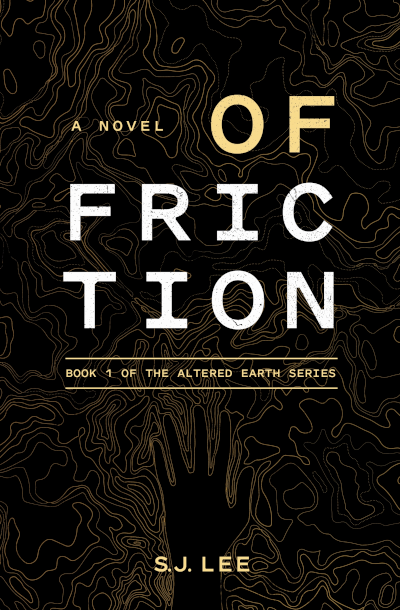
Of Friction is a milSF novel set on an environmentally fubar Earth which is shared uneasily by original recipe humans and the Altered, people who were genetically improved to flourish amidst the devastation. The marine Sam "Valkyrie" Ryan and her half-brother Scott "Mute" Reckert are assigned to protect a summit between the two branches of humanity facing terrorist threats from supremacists.
A superior race of human mutants are cohabitating the planet with their genetic inferiors. You don't have to be Charles Xavier to know we're about to find out what happens when people stop being polite and start getting real.
The marines enjoyed the monicker "wunbies" for the terrorist group, a term stemming from their supremacist mantra "one blood, one promise."
Although the Altered were elitist, the majority of this genetically-altered race left humans alone most of the time, probably hoping they would die out on their own. Apostates, however, were violently supremacist and sought to actively guide humans to their demise. They brought their own kind's ire on themselves with their extreme loyalty to the last Altered Sovereign, whose reign sought to eliminate humankind. It didn't help that the Apostates lacked care and mindfulness about collateral damage.
The novel is devoted to real battles along with a deeply painful familial clash between two close siblings. Valkyrie struggles with Mute's decision to leave the military, where they've served alongside each other for seven years in special ops.
The fast-paced action, depiction of military life and compelling relationship between the main characters were praised by judges.
R. K. Stumblingbear (YouTube):
A small unit is sent out to investigate some discontent rumors during an important summit. I loved how blended the cultures are in the future as humanity has banded together against the Altereds (genetically modified humans that have taken over the Earth).
Usually I hate prologues because I think that they don't add anything to the book but this one sets you up on the setting and the world without giving you too big of an infodump.
Richard's Reviews (Goodreads):
I'm not a big fan of military science fiction. I am a pacifist and vegetarian so reading about killing is not my go-to topic. ...
[T]his is not my favorite genre. That said, there was quite a bit to like about this book. The writing is tight, the characters interesting and engaging, and the concept a bit original. Most importantly, there is something special about Lee’s ability to put you, the reader, right into the action.
InkFinger (Goodreads):
A key measure of a book for me is if I choose to read the book instead of do other things I ought to be doing. I did a bit of that. It went down easy. It's obvious that either Lee has spent time in theater or done her homework. She captures both the fear and the boredom of being a soldier on the ground, excuse me a Marine.
This book is S. J. Lee's debut novel and the start of the Altered Earth series. The second book Of Friction comes out on March 25.
SPSFC 4 Quarterfinalist: Saint Elspeth
Each judging team in the Self-Published Science Fiction Competition (SPSFC) decides its own method for getting from their initial scout pile of novels to the ones that advance to the next stage. Ground Control to Major Tom had two to four judges read each of our 32 books in full, giving some of them a Strong Yes or Yes vote to recommend.
With eight books getting at least one Strong Yes vote and another 10 getting a Yes, there was an extremely close competition to become the six novels to advance. The second quarterfinalist we're revealing is Saint Elspeth by Wick Welker.

How did humanity handle the arrival of aliens dropping from the skies in giant organic pods shaped like zeppelins, ablaze from atmospheric friction? Not well:
I slept only an hour the first night in the underground bunker. My back ached from positioning the baby to my left all night. Acid reflux raged in my throat, stealing my appetite as I got in line for breakfast the next morning, but I shoveled eggs and oatmeal onto the tin plate. I quickly learned that bunker people are muted people. Conversation is lacking when, just the day before, you're hurried onto a helicopter and corralled into boxes of concrete and steel thousands of feet below the Sierra Nevada mountains. Word of the first nuclear strikes since 1945 graced our stressed out brains as we descended rock and earth the night before. The sky had been pregnant with alien invaders only two months before the world of men decided to turn against themselves. The powder keg of brinksmanship and geopolitical opportunists had finally been lit while Clive was still out there somewhere.
Countries nuked the pods within their borders and then nuked the ones in countries that left them alone. This game of global thermonuclear war leaves the world in ruin and a mere sliver of humanity hunkered down in bunkers until they can eventually come out. Twenty five years after the conflagration, Dr. Elspeth Darrow has set aside the grief for her lost family and operates the last hospital in Neo San Francisco. With medical supplies running out, she must venture into the California danger zone on a salvage run to find antibiotics and diuretics with a few old-world scientists and new-world medical students.
Judges loved the lead character and the realism that Welker brought to the subject as a doctor himself -- though not one who has 15,000 patients and nowhere to send a prescription.
Richard's Reviews (Goodreads)
Elspeth is a war widow, who lost her baby in childbirth, prefers working in a lab away from people, but who has been thrust into the role of primary healer for a group of humans who survived the apocalypse in an underground bunker near San Francisco. ...
While it is a first contact novel, the aliens are not a focus into much later in the book and it is the humans, not the aliens, that pose the biggest threat.
InkFinger (Goodreads)
I'm really glad I read this book. In the end, Welker has something to say about humanity, the nature of first contact, the possibilities of a post-apocalyptic world, and the essential decency of people when you let them be decent. I like Elspeth Darrow. I rooted for her.
SPSFC 4 Quarterfinalist: Drowning Earth
Ground Control to Major Tom, a team of judges for the fourth Self-Published Science Fiction Competition (SPSFC), began reading 32 books in September to determine which six should be our quarterfinalists. The time of choosing has begun. The next six posts on this blog will reveal those novels.
Our first quarterfinalist is Drowning Earth by Sean Willson.
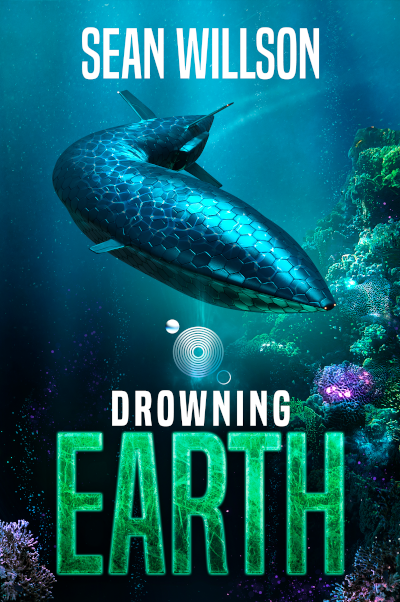
Drowning Earth is a thriller about a technologically peerless British submarine racing to claim a wealth of undersea biomass before the Russians and Chinese get there first. The story takes place in 2055 on Earth, where rising waters and other environmental calamities have left humanity in rough straits. Captain Kel Williams helms the HMS Bancroft, the first stealth submarine built since the UK quit and rejoined and left again and rejoined the European Union. Her boat serves a global coalition that also includes Australia, Africa and the United States, taking her manifestly competent crew into the world's deepest oceans.
After their sub had slipped through the frigid waters near the remains of the southern ice shelf, they headed northwest and were now crawling into the southern end of the Mariana Trench, the front line of a new war. One not waged over traditional land grabs but instead fought over biomass: untouched and pure biological material that could hold the cures to diseases or possibly form the foundation for new crops. ... Believe it or not, there were actually a few deeper sections of the ocean that the deadly touch of humanity had yet to infiltrate.
This plot sounds like present-day Tom Clancy and has a capable female protagonist in Williams who is as courageous, determined and indefatigable as Jack Ryan. But Willson takes things in a direction so otherworldly it would give Ryan the screaming heebie-jeebies. While the HMS Bancroft pursues its mission beset by enemies and sabotage, it's being watched by two godlike beings of science called Builders. They carry on a meta-narrative that includes debate over whether humans are necessary at all, which is not a great step for humankind.
Team judges praised the novel.
Richard's Reviews (Goodreads)
Drowning Earth is a well-written, dystopian science fiction book that takes place decades in the future aboard an advanced naval submarine. With a strong female protagonist, a cast of well-fleshed out supporting characters, pulse raising action, political intrigue, well-disguised saboteurs, and even an evil ex-husband, Sean Willson has written an exciting book.
R. K. Stumblingbear (YouTube)
A sci-fi thriller set on an experimental submarine that everyone wants to get their hands on. Really loved this fast past story, especially because by the end you are questioning if you can trust anyone.
Shadowcat (Goodreads):
Drowning Earth is a well-written technological thriller set on a near future Earth. If political intrigue, claustrophic atmospheres and sabotage are your thing, this could be the book for you. For me, I came for the amazing technology and will stay for the surprising god inclusions. I need to know how this ends.
Despite admitting that gods "give me pause," one judge loved the writing and is completely on board for the next book in the series. This is a good time to mention that the sequel, Dead in the Water, just came out in January.

